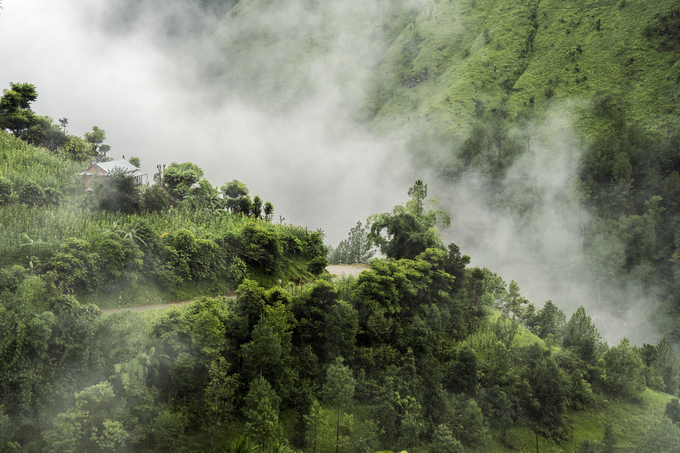May 21, 2025 | 10:02 GMT +7
May 21, 2025 | 10:02 GMT +7
Hotline: 0913.378.918
May 21, 2025 | 10:02 GMT +7
Hotline: 0913.378.918

The diverse and wide range of projects in FAO’s GCF portfolio improve livelihoods and food security with climate-resilient crops, agroforestry, sustainable fisheries, and better land and water management.
The Food and Agriculture Organization of the United Nations (FAO) has welcomed the renewal of its accreditation by the Green Climate Fund (GCF), a decision announced this Wednesday during the 37th meeting of the GCF Board. The reaccreditation reaffirms FAO's unwavering dedication to advancing climate action through agrifood system transformations and supporting countries in addressing the challenges posed by climate change.
FAO's initial accreditation by the GCF Board, effective in October 2018, marked the beginning of a highly successful partnership, which has since played a crucial role in supporting access to climate finance for developing countries. Over the years, this partnership has grown substantially, with $1.2 billion dollars now invested in climate projects.
“We are delighted with the Board’s decision to confirm FAO’s reaccreditation with the Green Climate Fund. With this affirmation, we can step up our efforts in supporting countries to deliver climate solutions and actions that transform agrifood systems for a more sustainable and food secure future for all,” said FAO’s Deputy Director-General, Maria Helena Semedo.
The GCF Accreditation is a formal recognition process that allows entities to access and manage financial resources from the GCF for climate-related projects and activities of countries. Accredited Entities play a pivotal role in facilitating the Fund’s mission to support developing countries in their efforts to combat climate change and its adverse effects.
A fruitful partnership
The FAO-GCF partnership is dedicated to accelerating countries' access to climate finance for adaptation and mitigation action.
The Green Climate Fund is a financial mechanism within the United Nations Framework Convention on Climate Change (UNFCCC), and as a specialized agency of the United Nations, FAO's mandate involves helping countries make their agrifood systems more efficient, sustainable, and resilient to climate change.
The diverse and wide range of projects in FAO’s GCF portfolio improve livelihoods and food security with climate-resilient crops, agroforestry, sustainable fisheries, and better land and water management. They also tackle biodiversity loss, land degradation and deforestation. The projects aim to ensure a better life and a better environment, especially for small-scale producers, women, youth and Indigenous Peoples.
FAO works closely with public and private sector partners to increase investments in projects that reduce greenhouse gas emissions and build resilience with locally led adaptation actions.
Over the years, the Organization has made substantial strides in ensuring the growth of its GCF portfolio and remains committed to accelerating access to finance for the transformation of agrifood systems.
The portfolio now boasts an impressive array of initiatives, including 20 transformative projects, 83 readiness projects, and 8 collaborative projects where FAO partners with other GCF-Accredited Entities to implement project activities. This expansion has made a significant impact on climate resilience and mitigation efforts in member countries.
Helping the most vulnerable
A significant portion of the portfolio is dedicated to projects in African countries, Least Developed Countries (LDCs), and Small Island Developing States (SIDS), where the most vulnerable communities are disproportionately affected by climate change.
In Africa, initiatives valued at over $128 million in GCF grants and co-financing are focused on enhancing the resilience of rural communities and protecting livelihoods in the agriculture, forestry, and fisheries sectors.
In the Gambia, for example, FAO leads the implementation of a pioneering fisheries-focused project which includes women as equal beneficiaries in efforts to restore degraded mangrove areas in key fisheries hotspots. The project is set to help 400,000 people and restore over 2000 hectares of degraded mangrove areas and critical fisheries hotspots and protect livelihoods in these coastal communities.
Meanwhile, a third of the projects in FAO’s $58.2 million readiness portfolio directly support Least Developed Countries. Some of these projects – in Chad, Burkina Faso, Niger and Senegal – have laid the groundwork for the development of a multi-country project (currently being reviewed by GCF) focused on scaling-up resilience in Africa’s Great Green Wall.
In Nepal, Indigenous Peoples communities are actively involved in an FAO-led GCF project focused on restoring ecosystems in the Churia region – an area critical for food and water security thanks to the major river systems that run through the hills and down to the heavily populated Terai plains.
Simultaneously, FAO also leads twelve readiness projects in Small Island Developing States, including three projects – in Belize, Grenada and Saint Lucia – designed to strengthen National Adaptation Plans.
The project in Belize, for instance, has helped the country develop a robust National Adaptation Plan to make its coastal zones and fisheries sector more resilient to climate change.
In its commitment to fostering country ownership, FAO actively promotes partnerships with GCF Direct Access Entities, such as the Central American Bank for Economic Integration (CABEI) and the National Fund for Environment and Climate (FNEC).
(FAO.org)

(VAN) Attempts to bring down the price of the Japanese staple have had little effect amid a cost-of-living crisis.

(VAN) Fourth most important food crop in peril as Latin America and Caribbean suffer from slow-onset climate disaster.

(VAN) Shifting market dynamics and the noise around new legislation has propelled Trouw Nutrition’s research around early life nutrition in poultry. Today, it continues to be a key area of research.

(VAN) India is concerned about its food security and the livelihoods of its farmers if more US food imports are allowed.

(VAN) FAO's Director-General emphasises the need to work together to transform agrifood systems.

(VAN) Europe is facing its worst outbreak of foot-and-mouth since the start of the century.

(VAN) The central authorities, in early April, released a 10-year plan for rural vitalization.